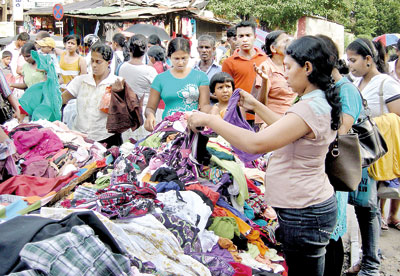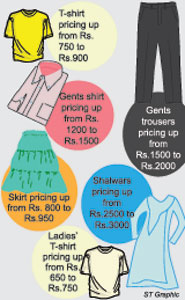News
Twist in Avurudu spending as high prices hit urban shoppers
View(s):Avurudu shoppers came out in force last week and cash registers rang amid complaints of prices being much higher than a year ago.
Interviews by the Sunday Times showed that shoppers this year were more aggressive in hunting for bargains than they were last year — a clear sign that spiralling prices have hit pockets. Most major clothing chains offered discounts of around 20 per cent.

Brisk shopping at Pamunuwa in Maharagama . Pix by Athula Devapriya
Clothes were the most popular purchase. Streets such as Pamunuwa road in Maharagama, where cheap clothes are available in plenty, teemed with people. But even vendors here estimated that prices were at least 40 per cent higher when compared with the same period last year.
Economists said that, despite other stresses, consumer sales in village economies would receive a boost from increasing foreign remittances by Sri Lankan migrant workers in the past week. Remittances were typically higher during the New Year season.
They predicted that the high cost of living was likely to curb Avurudu spending this year with smaller crowds at popular shopping centres in Colombo and other urban cities.
But bankers reported a strong rupee this week (rising to Rs. 125 against the dollar compared to Rs. 126 per dollar in the previous week) partly owing to increasing inflows of remittances. “Traditionally, remittances increase during this period as workers send more money home for New Year purchase needs,” one banker said, explaining the variance in spending patterns between middle and lower middle-class consumers. “In such a case, village economies are awash with cash much more than in urban cities like Colombo.”
Shopping streets like Pettah or Nugegoda have been drawing crowds but many consumers were looking for bargains, reducing their food bill and using the money for clothes and non-food Avurudu needs.
Meanwhile, a call for a boycott of Muslim shops does not seem to have derailed business for these institutions. “We have seasonal promotions and discounts,” said M. Ashraf, showroom manager at the Borella branch of NoLimit. “There have been increased sales in women’s and children’s clothing.”
NoLimit was one of the first Muslim-owned establishments to be targeted in demonstrations by extremist Buddhist groups. Brisk shopping was also observed at several branches of Fashion Bug. Its Pepiliyana outlet was trashed by protesters on March 29.
Reports from the provinces said high prices and financial hardship were affecting shoppers in some cities, particularly in the hill country which had a high concentration of estate employees. A textile vendor in Hatton said the market was usually crowded for Avurudu, but not this year. “We are expecting an increase in business after April 10 as all the workers would have received their salaries,” he said optimistically.

Nawalapitiya resident R. Perumal, who has five children, was worried about steep food prices that he said were forcing estate workers to take out loans to celebrate the New Year as they lacked ready cash. Kamala Wijesundera, a mother of two from Ratnapura, also fretted about food prices. “We usually buy readymade sweetmeats but they are too expensive this year,” she said.
Our Trincomalee correspondent reported that the main shopping area was crowded with people stocking up for the New Year. Abdul Rahim, an entrepreneur, said the buyers predominantly came from rural areas. Here, shopping was better than last year — and despite the heightened cost of living.
Pavement vendors have laid out their wares in Jaffna, and retail outlets, big and small, are well stocked. But businessmen report fewer shoppers than last year. Textile traders from Jaffna said sales were poor because vendors from other parts of the country were travelling to the peninsula to carry out Avurudu business.
“I got 5,000 rupees as a festival allowance but it’s not enough because a decent shalwar costs 3,000 rupees,” said A. Nishanthini, a public sector worker in Jaffna.
Police to get tough, Avurudu transport
Plainclothes policemen will be deployed on trains and buses to uphold the rule of law during the Avurudu season, said police spokesman SSP Buddhika Siriwardene. They will also act as a deterrent to pickpockets, who come out in great numbers during this period.
There will also be more uniformed police on the streets and large numbers of traffic policemen have been tasked with detecting drunken drivers till the end of the national holidays.
The Government will bring in extra train and bus services. “Extra trains will be deployed from April 5 to 17,” said the Operating Superintendent of Sri Lanka Railways, L.A.R. Ratnayake. “This will include special services to Galle, Matara, Badulla and Vavuniya. We will have double-set trains to Vavuniya.”
Additional bus services to destinations including Kataragama, Anuradhapura, Kandy and Nuwara Eliya, will operate from April 8 to 12. The largest crowds are expected on April 10-12. They will travel to the provinces from Colombo.
On April 13, there will be a 24-hour bus service from Colombo to major cities. From April 15-20, there will be special services from the provinces to Colombo. Arrangements will also be made for commuters catching buses to their villages after disembarking at railway stations.
Follow @timesonlinelk
comments powered by Disqus

















